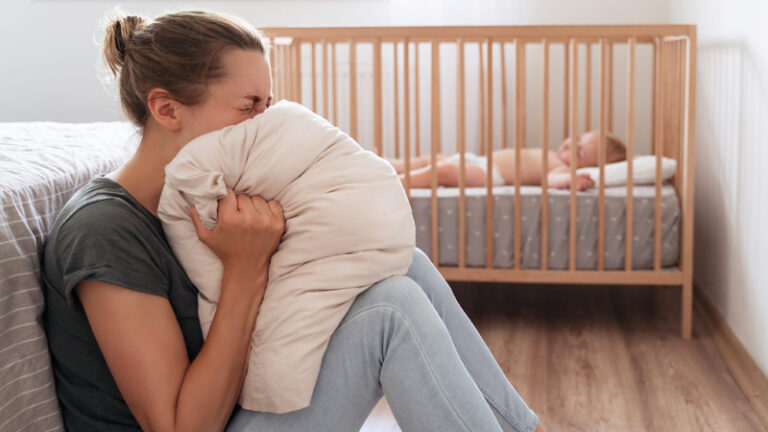Postnatal Depression (Postpartum) …
Symptoms, Causes and Treatment
Depression that is experienced during postpartum (the first year following the birth of a baby) is known as postnatal depression or postpartum depression.
Women typically go through a wide range of emotions during the first year period after giving birth. Becoming a parent is one of life’s biggest transition events, something that can be the most rewarding and, at the same time, the most challenging thing you’ve ever experienced.
There will be moments of happiness and excitement, but also times when there will be feelings of worry, anxiety, being overwhelmed or negativity, which can indicate postpartum depression. Interestingly, it’s not just new mums who experience postpartum depression, as partners and men may likewise be affected.

What’s the Difference Between Postpartum
Depression and the ‘Baby Blues’?
Fifty to eighty per cent of women go through what is known as the “baby blues”, which often starts within 3 – 4 days after giving birth and naturally goes away within two weeks with little or no long term side effects.
Symptoms include:
- Mood swings, irritability, low and anxious mood
- Becoming tearful easily
- Overreacting to things
- Feeling overwhelmed
The baby blues are believed to be caused by hormonal changes in the body. However, unlike postnatal depression, it typically resolves without the need for treatment and doesn’t interfere with your daily life.
If you find yourself still struggling with the above symptoms for more than two weeks, you might be dealing with postnatal depression and not the baby blues. If this is the case, it’s crucial to seek professional help.

Signs of Postnatal Depression
Depression experienced during the postpartum period is similar to other types of depression in many ways; the only difference is that the anxious and negative thoughts, typical of depression, are centred on the new baby. In addition, some postpartum depression symptoms overlap with some common post-birth symptoms.
Symptoms of postpartum depression include:
- Feeling sad, low in mood or tearful most of the time
- Feeling agitated or irritable towards your partner, baby or other children
- Loss of interest in the world around you and no longer enjoying things that used to give you pleasure (like you “cannot be bothered”)
- Lack of energy and feeling tired all the time
- Trouble sleeping at night – you may be awake even when your baby is sleeping
- Feeling very sleepy during the day
- Problems concentrating and making decisions
- Loss of appetite or overeating (comfort eating)
- Negative thoughts such as feeling you are not a good enough mother, you are unable to look after your baby or your baby does not love you
- Feelings of guilt, hopelessness and self-blame
- Feeling anxious that something bad may happen to your baby
- Problems bonding with your baby, no sense of enjoyment in being with them
- Thoughts of ‘I wish I would not wake up’ or ‘my baby would be better off without me’ or intent, desire or plans to end ones’ life
The degree to which your depression affects your ability to care for your newborn varies from person to person. Despite being unwell, many new mums still manage to take good care of their children. However, if you are struggling with depression, you may need assistance in caring for your baby and other children until you’re well again.
Sadly, in some cases, women, their families, and even health professionals fail to recognise that new mums have postnatal depression, which means that many women endure the disorder longer than necessary before receiving treatment. Some possible reasons for this include:
- Wrongly assuming the symptoms are a normal part of adjusting to a new baby, you might not speak to anyone about how you’re feeling.
- Worrying unnecessarily that if you admit you’re struggling, health professionals may think you can’t care for your baby.
- Feeling guilty about not being happy and excited following the birth of a baby, thus being ashamed to admit you’re having a difficult time.
Don’t be afraid to ask for help if you think you might be unwell because anyone can experience mental health issues during the postpartum period.
What Causes Postnatal Depression
Postpartum depression cannot be attributed to a single cause. Many different biological, psychological, and social factors can contribute to the development of depression in the postpartum period. Some of the factors associated with postpartum depression include:
- A history of mental health problems
- Depression or anxiety during pregnancy
- Lack of support from family and friends
- A traumatic birth experience
- Childhood experiences
- Certain personality traits

How to Cope with Depression in the Postpartum Period
If you find yourself struggling with low mood and symptoms of depression in the months following your delivery, it’s helpful to keep in mind the following key strategies, thought processes, and principles that might help you cope better.
- Try to be realistic
Childbirth is a milestone event, and the majority of women want to be the best mother they can be. However, it’s important to understand the difference between aspiring and expecting to be perfect. Motherhood is a role that can be very difficult to get used to. It is beneficial to try and cultivate a well-rounded image of motherhood that includes both its joys and challenges.
- Don’t be a superhero
Most people struggle with accepting offers of help, but the reality is that a woman with a young baby will likely need support. Trying to do everything on your own is probably okay if you’re operating at your usual level. However, if you experience postnatal clinical depression, everything will become much harder. Try not to be embarrassed about seeking assistance. Think about approaching people you feel you can count on. Don’t assume that those closest to you, like your partner, mother or best friend, will instinctively be aware of your needs. You have to let them know.
- Don’t neglect your own needs
Most new mothers put their baby’s welfare first and theirs second. Keep in mind that your ability to take care of your baby depends on the state of your physical and emotional health. Ensure that you recognise, prioritise and attend to your needs. Getting enough sleep, eating a healthy diet, and exercising can be very helpful in coping with the monotony of mothering.
- Reach out for help
If you do not feel your best after giving birth, do not be ashamed or embarrassed about reaching out for help and additional support. Try to share your feelings with your health visitor or GP, who can assess your condition and inform you of the most appropriate treatment options.

What lies behind us and what lies before us are
tiny matters compared to what lies within us
Postnatal Depression Treatment
We offer specialist treatment for postnatal and antenatal depression (depression during pregnancy) at our network of clinics and wellbeing centres throughout the UK.
Your mental health, both while pregnant and after the birth of your baby, is as equally important as your physical wellbeing at these times. The appropriate treatment will support your overall health, enabling you to fully enjoy your family life.
Depending on the severity of your postnatal depression symptoms, we can offer several different treatment programmes:
- Outpatient treatment for anxiety
This involves making regular visits at one of our wellbeing clinics or treatment centres for your depression therapy sessions. Often done on a weekly basis, this flexible format of treatment allows you to schedule your sessions around your work and other commitments.
- Day care
With day care, your postnatal depression therapy entails going to any of our dedicated clinics each week for a certain number of full or half days. This treatment format is designed for people who don’t need intensive 24-hour support but require continuous and structured care for their depression.
- Inpatient (residential) treatment
Inpatient treatment for postnatal depression involves staying at one of our treatment centres on a residential basis, where you will be provided with intensive treatment and 24-hour support. Inpatient treatment gives you a chance to take a break from your everyday life and whatever negative influences are making your depression worse – reasons why this treatment format is effective in treating postnatal depression.
Online therapy for anxiety
We also offer online therapy to provide flexibility and meet the needs of our patients. This therapy format allows you access to support for postnatal depression from the comfort of your home and at a time that’s convenient for you.

Therapy for Postnatal Depression
We also have a range of different therapy formats to help you recover from postpartum depression. These include:
Cognitive behavioural therapy (CBT)
The primary type of therapy that we use in postnatal depression treatment is cognitive behavioural therapy (CBT), which aims to help you alter your negative thinking patterns, which are common in depression. Whether while pregnant or after giving birth, depression may lead to a lack of confidence or negative judgement of yourself as a parent. CBT provides the techniques to help you manage these thoughts and improve your mood so you can become confident as a parent and enjoy your pregnancy, baby, and other children even more.
One-to-one therapy
This type of therapy is done on an individual basis between yourself and an anxiety specialist. During your sessions, the therapist will be able to address your unique concerns, helping you achieve the best results as an individual. This therapy can be done face-to-face or as part of therapy conducted online.
Group therapy
This is a support group type of therapy. People who have been diagnosed with anxiety or suffering through similar issues make up the group, and the aim is to share your experiences, offer mutual support and guidance, and talk with compassionate people about your anxiety in a safe space without the fear of being judged. Together, these groups provide a rich source of strength and hope to those attending the sessions.
Family and couples therapy
This is another kind of group therapy but one that involves your family or loved ones. It aims to help you have an open and honest conversation with these people about your anxiety, enabling them to have an understanding of anxiety, recognise the signs and symptoms, and examine the impact that anxiety is having on you and them.
Medication for Postnatal Depression
Medication can also be prescribed to assist you with your postnatal depression, which you can take alongside CBT and other types of therapy. A medication given by a highly trained psychiatrist works to complement the therapy treatments. The most common form of medication is antidepressants:
- Selective serotonin reuptake inhibitors (SSRIs)
There are various types of antidepressant medication. The most commonly used for postnatal depression is the class of antidepressants called selective serotonin reuptake inhibitors (SSRIs)—these work by restoring the balance of chemicals in the brain that regulate mood and emotions. You may have already been taking antidepressants before you became pregnant, or you may need to start taking them during pregnancy or after giving birth.
Whatever the case may be, you should talk to your doctor about the safety of taking antidepressants during pregnancy and while breastfeeding. Your doctor will be able to help you determine if this type of treatment is suitable for your particular case. If you’re on antidepressant medication and you become pregnant, it’s important not to discontinue it without first consulting with your doctor.
Experiencing depression after the birth of your baby can mar what should be one of the most joyful times in your life. It’s important to understand that postpartum depression can be treated, and with help from a specialist, you can make a full recovery and enjoy the new addition to the family.
FREE Postnatal Depression Assessment
If you are struggling with postnatal depression, there is hope and healing for you. You can receive treatment as an outpatient or inpatient and through one-on-one or support group therapy. We understand the challenges you’re facing and we’re here to offer compassionate help and support.
We design personalised treatment plans that meet an individual’s unique needs and circumstances. We will work together to address your symptoms, help you develop coping strategies and enable you to live life to the full with your family and new baby.
Our highly trained advisers are available to speak to you right away, simply call 0808 252 3379 today.
We can discuss your concerns in complete confidence, explore the options for treatment, and help you to understand what will work best for you.
We’ll also help you to book your free depression assessment there and then, with appointments usually available within only a few days.
We understand that taking the first step can be the most difficult, but we’re here to support – with no pressure or judgement.
Professional and compassionate help is just a phone call or click away.




